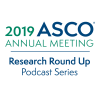One Family’s Mission to Stop Hair Loss from Chemotherapy: Your Stories Podcast
In this “Your Stories” podcast from Conquer Cancer, the ASCO Foundation, siblings Claire and Rich Paxman discuss how their mother’s experience of losing her hair after chemotherapy inspired their work.










